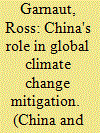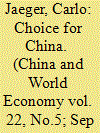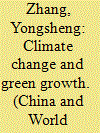|
|
|
Sort Order |
|
|
|
Items / Page
|
|
|
|
|
|
|
| Srl | Item |
| 1 |
ID:
134359


|
|
|
|
|
| Summary/Abstract |
China contributed a majority of the growth in global greenhouse gas emissions in the first 11 years of this century. The trajectory of emissions has changed radically since then, as China has implemented its Cancun 2010 commitment to reduce the 2005 emissions intensity of economic activity by 40–45 percent by 2020. The change in trajectory has been reinforced by China's new model of economic growth, with its greater emphasis on equity in income distribution, consumption and services. The large-scale deployment of low emissions technology in China is lowering the cost of transition to a low carbon economy all over the world. China's new emissions trajectory improves the opportunity for the international community to meet the 2°C climate target. It is essential that the changes in China are brought to account in shaping global mitigation ambition.
|
|
|
|
|
|
|
|
|
|
|
|
|
|
|
|
| 2 |
ID:
134365


|
|
|
|
|
| Summary/Abstract |
Green growth cannot succeed without significant changes in the education system and the closely related social division of labor. This paper combines historical evidence and a game-theoretic analysis to study the relation between vocational education and green growth. It is found that a low-vocation and a high-vocation equilibrium can be distinguished in the interplay between education and labor markets, and that a high-vocation equilibrium is better suited for green growth. At the present stage of development, there are tendencies in both directions in China. Therefore, China has the possibility to successfully implement a green growth strategy by developing a strong vocational education with Chinese characteristics.
|
|
|
|
|
|
|
|
|
|
|
|
|
|
|
|
| 3 |
ID:
134367


|
|
|
|
|
| Summary/Abstract |
This paper presents a new research agenda on climate change and green growth from the perspective of the division of labor in classical economics. The paper covers three major dimensions of green growth (i.e. carbon emissions, environmental protection and material resources use) and some related important topics, as well as the fresh policy implications of the new research agenda, Typical marginal analysis in a given structure of the division of labor suggests that “green” action is a burden to economic development. Therefore, climate negotiation has become a burden-sharing game and has reached a stalemate. New thinking is badly needed to rescue these negotiations and to drive a shift to a new “green growth” paradigm. The proposed new research agenda represents an effort to create a new narrative on climate change and green growth. Because the new research agenda can theoretically predict the possibility that a more competitive structure of the division of labor could be triggered by “green” policy, it has promising policy implications for various important challenges facing us in the 21st century.
|
|
|
|
|
|
|
|
|
|
|
|
|
|
|
|
| 4 |
ID:
134362


|
|
|
|
|
| Summary/Abstract |
China needs to reduce its carbon emissions if global climate change mitigation is to succeed. Conventional economic analysis views cutting emissions as a cost, creating a collective action problem. However, decarbonization can improve productivity and provide co-benefits that accord with multiple national policy objectives. We track China's progress in reducing the emissions intensity of the economy, and construct a macro scenario with China's carbon emissions peaking in the 2020s. Investment in greater energy productivity and economic restructuring away from heavy industries can bring productivity gains, and decarbonization of energy supply has important co-benefits for air pollution and energy security. Combined with lower climate change risks and the likelihood that China's actions will influence other countries, this suggests that cutting carbon emissions is not only in China's self-interest but also in the global interest. To properly identify the true costs and benefits of climate change action requires new thinking in economic analysis.
|
|
|
|
|
|
|
|
|
|
|
|
|
|
|
|
| 5 |
ID:
134366


|
|
|
|
|
| Summary/Abstract |
The current model of economic growth generated unprecedented increases in human wealth and prosperity during the 19th and 20th centuries. The main mechanisms have been the rapid pace of technological and social innovation, human capital accumulation, and the conversion of resources and natural capital into more valuable forms of produced capital. However, there is evidence emerging that this model may be approaching environmental limits and planetary boundaries, and that the conversion of natural capital needs to slow down rapidly and then be reversed. Some commentators have asserted that in order for this to occur, we will need to stop growing altogether and, instead, seek prosperity without growth. Others argue that environmental concerns are low-priority luxuries to be contemplated once global growth has properly returned to levels observed prior to the 2008 financial crisis. A third group argues that there is no trade-off, and, instead, promotes green growth: the (politically appealing) idea is that we can simultaneously grow and address our environmental problems. This paper provides a critical perspective on this debate and suggests that a substantial research agenda is required to come to grips with these challenges. One place to start is with the relevant metrics: measures of per-capita wealth, and, eventually, quantitative measures of prosperity, alongside a dashboard of other sustainability indicators. A public and political focus on wealth (a stock), and its annual changes, could realistically complement the current focus on market-based gross output as measured by GDP (a flow). This could have important policy implications, but deeper changes to governance and business models will be required.
|
|
|
|
|
|
|
|
|
|
|
|
|
|
|
|
| 6 |
ID:
134360


|
|
|
|
|
| Summary/Abstract |
Since economic reforms began in 1978, China's urban population has increased by half a billion. Over the next 20 years, cities will likely add another 300 million people through local population growth, migration and the integration of nearby rural areas. Cities account for the majority of resource use and pollution so achieving greener growth will depend on developing and implementing a more sustainable urbanization model. China's leaders have responded to these challenges with ambitious goals and comprehensive environmental laws and regulations. These have so far not significantly reduced the harm from air, water and soil pollution: in large measure because China's green governance does not match its green ambitions. Drawing on the World Bank's work on green growth and a recent joint urbanization study by the Development Research Center of China's State Council and the World Bank, this paper reviews recent academic research on green governance in urban China and discusses its main implications in the context of emerging global green growth concepts.
|
|
|
|
|
|
|
|
|
|
|
|
|
|
|
|
|
|
|
|
|